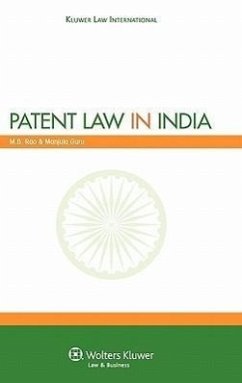
2005, ISBN: 9041132600
[SR: 9578827], Hardcover, [EAN: 9789041132604], Kluwer Law International, Kluwer Law International, Book, [PU: Kluwer Law International], Kluwer Law International, The 2005 Amendments to … Meer...
| amazon.com Island Trading Company Gebraucht Verzendingskosten:Usually ships in 1-2 business days, exclusief verzendingskosten Details... |

2005, ISBN: 9041132600
[SR: 9578827], Hardcover, [EAN: 9789041132604], Kluwer Law International, Kluwer Law International, Book, [PU: Kluwer Law International], Kluwer Law International, The 2005 Amendments to … Meer...
| amazon.com KANHA USA , Neuware Verzendingskosten:Usually ships in 1-2 business days, exclusief verzendingskosten Details... |

2005, ISBN: 9789041132604
Kluwer Law International. Hardcover. New. Hardcover. 440 pages. Dimensions: 9.8in. x 6.4in. x 1.1in.The 2005 Amendments to the Indian Patent Act expanded the scope of patentability by (… Meer...
| Biblio.com |

ISBN: 9041132600
[SR: 196107], Gebundene Ausgabe, [EAN: 9789041132604], Kluwer Law International, Kluwer Law International, Book, [PU: Kluwer Law International], Kluwer Law International, 63951011, Geisti… Meer...
| Amazon.de (Intern... MEDIMOPS Gebraucht Verzendingskosten:Innerhalb EU, Schweiz und Liechtenstein (soferne Lieferung möglich) (EUR 3.00) Details... |

2010, ISBN: 9789041132604
Buch, Hardcover, [PU: Kluwer Law International], Kluwer Law International, 2010
| lehmanns.de Verzendingskosten:Versand in 10-20 Tagen. (EUR 0.00) Details... |


2005, ISBN: 9041132600
[SR: 9578827], Hardcover, [EAN: 9789041132604], Kluwer Law International, Kluwer Law International, Book, [PU: Kluwer Law International], Kluwer Law International, The 2005 Amendments to … Meer...

2005, ISBN: 9041132600
[SR: 9578827], Hardcover, [EAN: 9789041132604], Kluwer Law International, Kluwer Law International, Book, [PU: Kluwer Law International], Kluwer Law International, The 2005 Amendments to … Meer...
2005
ISBN: 9789041132604
Kluwer Law International. Hardcover. New. Hardcover. 440 pages. Dimensions: 9.8in. x 6.4in. x 1.1in.The 2005 Amendments to the Indian Patent Act expanded the scope of patentability by (… Meer...

ISBN: 9041132600
[SR: 196107], Gebundene Ausgabe, [EAN: 9789041132604], Kluwer Law International, Kluwer Law International, Book, [PU: Kluwer Law International], Kluwer Law International, 63951011, Geisti… Meer...
2010, ISBN: 9789041132604
Buch, Hardcover, [PU: Kluwer Law International], Kluwer Law International, 2010
Bibliografische gegevens van het best passende boek
| auteur: | |
| Titel: | |
| ISBN: |
Gedetalleerde informatie over het boek. - Patent Law in India
EAN (ISBN-13): 9789041132604
ISBN (ISBN-10): 9041132600
Gebonden uitgave
Verschijningsjaar: 2010
Uitgever: Kluwer Law International
440 Bladzijden
Gewicht: 0,789 kg
Taal: eng/Englisch
Boek bevindt zich in het datenbestand sinds 2012-01-20T15:27:50+01:00 (Amsterdam)
Detailpagina laatst gewijzigd op 2022-06-01T01:05:47+02:00 (Amsterdam)
ISBN/EAN: 9789041132604
ISBN - alternatieve schrijfwijzen:
90-411-3260-0, 978-90-411-3260-4
alternatieve schrijfwijzen en verwante zoekwoorden:
Auteur van het boek: guro, rao, manjula
Andere boeken die eventueel grote overeenkomsten met dit boek kunnen hebben:
Laatste soortgelijke boek:
9789041165367 Patent Law in India (Manjula Guru; M.B. Rao)
< naar Archief...

